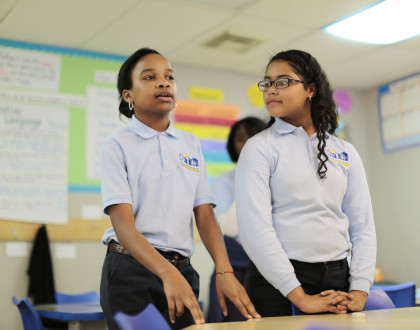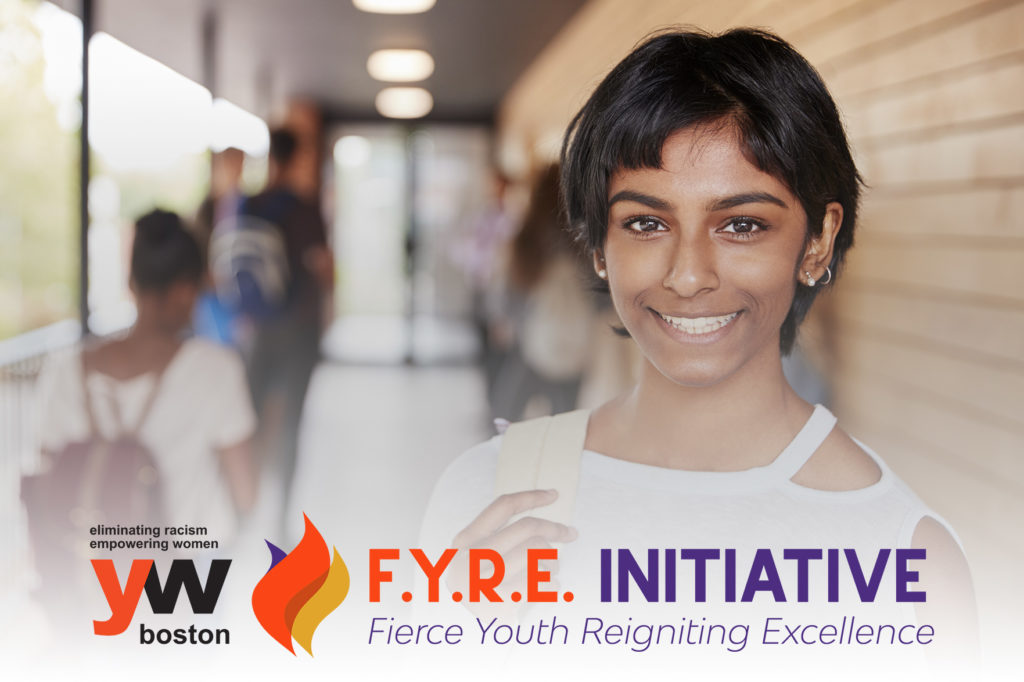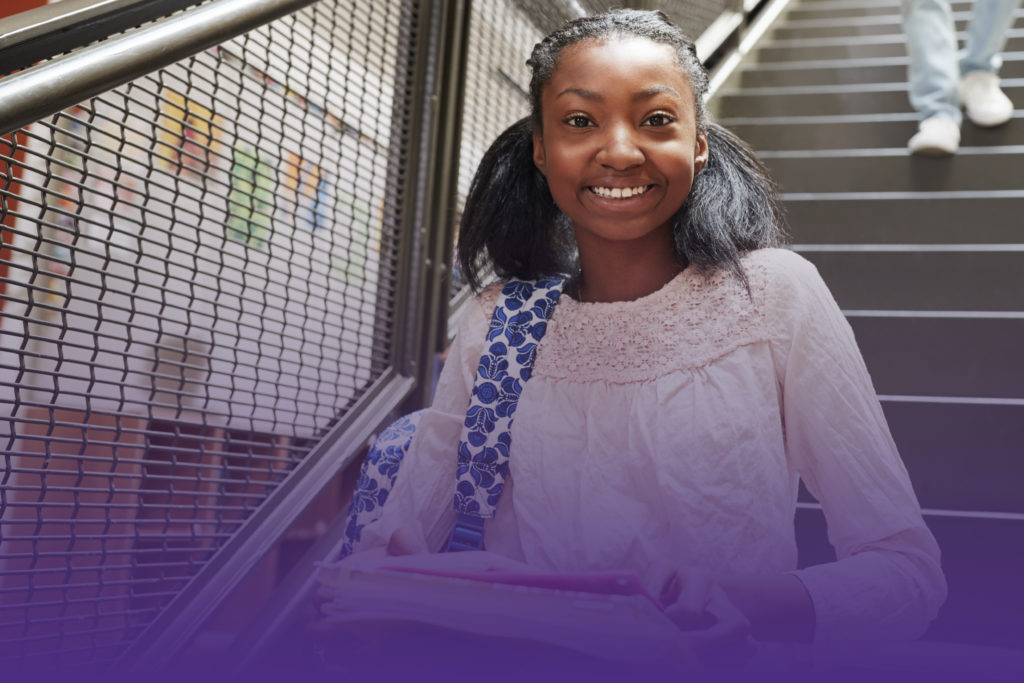Lessons from F.Y.R.E.: Advocacy and community building are all about healthy relationships

Each February we recognize Teen Dating Violence Awareness Month. One in three people in the United States will experience abuse by someone they are in a relationship with before they become adults. At YW Boston, we recognize that addressing this statistic means teaching people about healthy relationships at a young age. Our girls leadership program, the F.Y.R.E. Initiative, meets girls in Boston where they are – their school or Out of School Time programs – with a curriculum that combines social justice education, positive identity development, and civic engagement. One of F.Y.R.E.’s key sessions is ‘Healthy Relationships,’ which helps participants reflect on their personal boundaries and practice advocating for those boundaries. We sat down with the F.Y.R.E. Initiative Coordinator Caiana Luse and learned about how building and maintaining all types of healthy relationships provide the backbone to the program’s work to engage participants in community-based action.

Healthy Relationships go hand in hand with advocacy and empowerment
Middle school is a point of transition for many people, which is why the F.Y.R.E. Initiative program focuses on 6th through 9th grade girls. During these years, youth begin to think for and take action on behalf of themselves. This early stage of self-advocacy can create conflict in their relationships with friends, classmates, teachers, parents, etc. This is also when they begin to take action to build romantic and/or physical relationships. In the F.Y.R.E. curriculum, Caiana states, “We think of all different types of relationships.” The skills needed to advocate for yourself in a romantic relationship are similar to those needed to advocate for yourself in a parental or friendship relationship.
Fostering healthy relationships and advocacy cannot be untied. As Caiana puts it, one can’t “have a healthy relationship if one does not know how to advocate for themselves” and at the same time, “One can’t advocate for themselves if they don’t feel empowered, or have a healthy relationship with themselves.” This is why, before approaching the ‘Healthy Relationships’ curriculum, F.Y.R.E. works with girls on building their personal power and self-esteem. This creates a base of self-understanding that girls can root themselves in when learning about healthy relationships.
Following this lesson, they learn how to advocate for their community. As they build out their Community Action Projects, Caiana explains, we do a root cause analysis, look into our own communities, identify problems, and figure out ways we can change them or move forward with solutions.” In order to do that, “the girls go out and speak with local professionals or people in their community. That takes a lot of self-advocating. They are not only advocating for themselves but also advocating for others.” Before they get to that stage, the healthy relationships curriculum allows them to practice finding their words and speaking up. In fact, Caiana notes that topics about relationships come up in every session because all areas of the curriculum, from ‘Unpacking Racism and Sexism’ to ‘Collective Power’, involve the relationships the F.Y.R.E. participants are fostering.
'One can’t have a healthy relationship if one does not know how to advocate for themselves and at the same time, one can’t advocate for themselves if they don’t feel empowered, or have a healthy relationship with themselves.' Click To Tweet
Self-Advocacy is a skill that requires practice
The ‘Healthy Relationships’ curriculum takes participants through the following activities:
- Defining different types of relationships that exist, including those that are romantic, within one’s family, between friends, to with oneself.
- Creating a relationship spectrum where participants categorize relationship behaviors between healthy and unhealthy behaviors. This activity is coupled with discussion and questions such as “How do you know something is unhealthy?” or “How can you let someone know what feels healthy or unhealthy to you?” They learn that one person’s expectations of healthy and unhealthy will differ from others’, but that it is key to know your boundaries and practice explaining your boundaries to others.
- Acting out different scenarios of both healthy and unhealthy relationship habits. As Caiana explains, “The first step to practicing is finding your words. Being able to verbalize yourself so that someone outside of you can understand what you are saying. Also, we stress that everyone is entitled to their own boundaries and that sometimes your boundaries have to be stated more than once because no one can read your mind.” Practicing these skits is a way for F.Y.R.E. participants to become comfortable restating their boundaries without becoming flustered, because expressing one’s boundaries is key to a healthy relationship.
- Discussing the skits with questions such as “What can you do when you feel stuck in a tough situation like these? Whom can you ask for help?” The girls identify people in their life, like teachers, parents, or counselors, who they can turn to.
- Reading through and signing the Relationship Bill of Rights. The Relationship Bill of Rights, designed by Legal Momentum, includes statements such as “Free Movement: The right to control my own body and thought, as well as my comings and goings” and “Friends: The right to choose my friends even if others do not approve of them.” It recognizes that no one can take these rights away, and that all people have these same rights. All F.Y.R.E. participants take their signed copy of the Relationship Bill of Rights home with them.
This curriculum is designed for each student to leave knowing “We all have a right to our own body and our own boundaries” and how to explain these boundaries, sometimes more than once, to the people in their life.

Adults have a role in fostering healthy relationship practices in teens
Whether you are a parent, educator, work with youth, or simply interact with teenagers in any space, there are things you should know about helping teens feel confident in their relationships and their boundaries. Caiana wants all adults to know that “Youth are the experts of their own experience.” So, the most important thing you can do is “help them understand that they have the right to choose and that their feelings and rights deserve to be respected.” You can create forums for teens to verbalize their boundaries, choices, or challenges, so that you can listen to what they need. Oftentimes, this verbalization can be the most useful tool for teens, as they can begin to find their words and advocate for their positions.
If you feel it is necessary to intervene in a teenager’s unhealthy relationship, Caiana urges you to remember that “Trauma is not ‘one size fits all’ and manifests differently for everyone, so there is not a specific set of guidelines on how to deal with it.” This is why keeping communication open between teens and adults is crucial, so that adults can provide their power and resources in a welcome and fitting way. For those who work with students, invest in training and education for all faculty and staff so that they can appropriately counsel students through trauma. Further, you can incorporate a healthy relationships curriculum, or bring in the F.Y.R.E. program, so that all teens can learn how to self-advocate.
______
About the F.Y.R.E. Initiative
With the F.Y.R.E. Program, launched in the Fall of 2019, YW Boston facilitators conduct a 12-15-week leadership development series for girls grades 6th through 9th. The series brings together social justice education, positive identity development, and civic engagement, culminating in small group civics projects. This model takes place in schools or Out of School Time programs, and it is developed to operate in a “girls group” structure rather than a traditional classroom structure. Core to the program is an effort to provide experiential learning opportunities and dialogue to build understanding and increase social-emotional learning.
About YW Boston
As the first YWCA in the nation, YW Boston has been at the forefront of advancing equity for over 150 years. Through our DE&I services—InclusionBoston and LeadBoston—as well as our advocacy work and youth programming, we help individuals and organizations change policies, practices, attitudes, and behaviors with a goal of creating more inclusive environments where women, people of color, and especially women of color can succeed.
